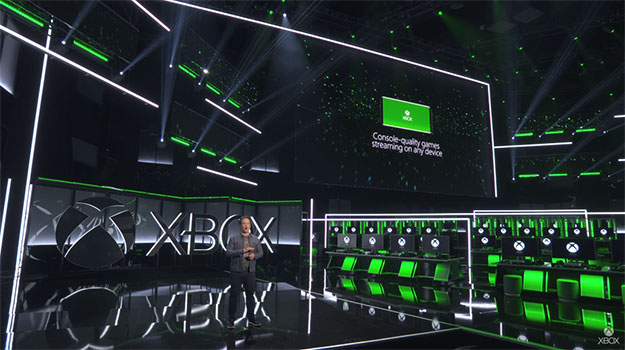Microsoft's Upcoming Streaming Service To Deliver High Quality Gaming To Any Device

Microsoft Research and its cloud engineers are busy building a cloud network that promises to deliver console-quality game streaming on any device, the company's Phil Spencer said on stage at E3. While details are light at the moment, Microsoft did say that the upcoming service is rooted in its artificial intelligence and machine learning technologies. To what extent remains to be seen, as does everything else about the new service.
Spencer did not elaborate on when the service might launch or what pricing will look like. Still, it's an interesting path that Microsoft is embarking on, and not exactly an easy one. Microsoft is not the first company to see the potential in rolling out a streaming service. Does anyone remember OnLive? It aimed to be the Netflix of games (sort of), but whether the technology proved too difficult or the company was just ahead of its time is debatable. Sony acquired OnLive for its patents in 2015 and, weeks later, shut the service down.
Other game streaming services have seen a bit more success, such as Sony's PlayStation Now and NVIDIA's GeForce Now. LiquidSky based in New York is also making a run at the streaming game sector, but is still in beta after launching in the first quarter of 2017. It's a challenging market, in part because of the latency that is inevitably introduced when streaming a game to play in real-time.
Microsoft is uniquely positioned to deal with that specific challenge, both because of its massive resources (technical and monetary) and due to how large its Azure platform is. When Microsoft launched its Xbox One X console last year, Spencer said that the company would have a streaming service of some kind within three years. The announcement at this year's E3 seems to double down on that statement, assuming it is something we will see sooner than two years from now.
The timing is interesting too. We are starting to see some serious mobile phones aimed at gaming. The Razer Phone is one of them, with a 120Hz display and 8GB of RAM, and earlier this month ASUS unveiled its ROG Phone with a 90Hz display, up to 512GB of internal memory, and ultrasonic triggers. There's also Xiaomi's Blackshark handset.
Will these pieces fit together? Time will tell, but one thing that's unmistakable is that gaming is alive and well. Related to that, Spencer said the hardware team that designed the Xbox One X is "deep into architecting the next Xbox consoles."

